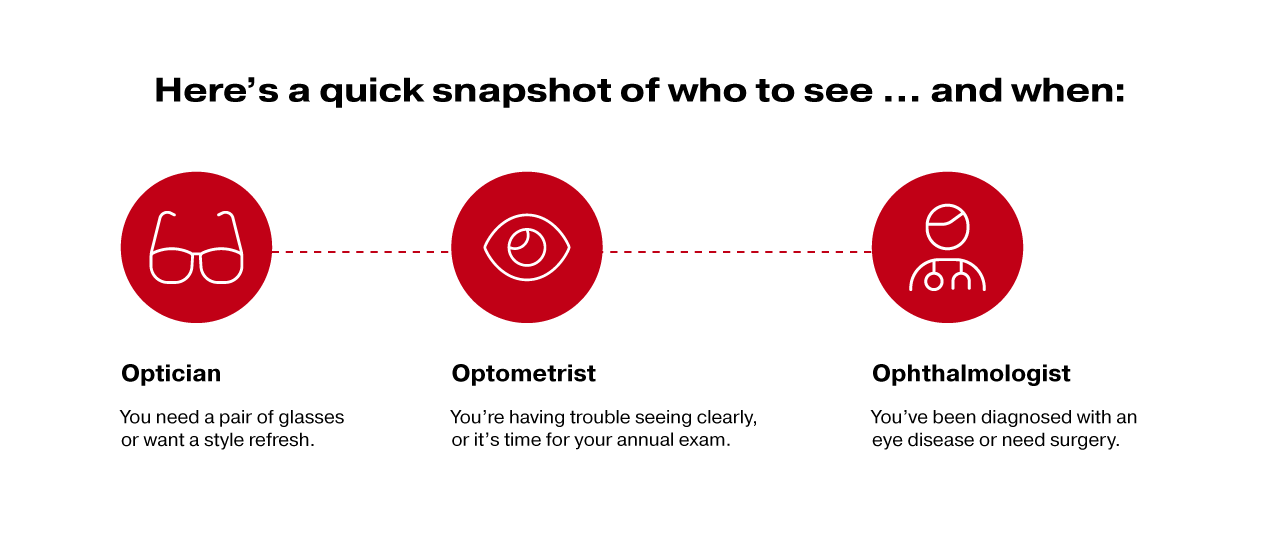08/12/2025
Optometrist, Ophthalmologist and Optician: What's the Difference … and Who Should You See?

When your employees are working in environments that demand precision, focus and protection, clear vision isn’t optional; it’s an absolute must-have. That’s why prescription safety eyewear should be more than just a workplace requirement. It’s a key part of helping your team do their job safely and effectively.
But behind every pair of safety glasses is a team of eye care professionals, each with a unique role in helping workers see their best and stay protected. Whether they’re getting an annual exam, updating a prescription, or picking out frames that meet ANSI standards, it's helpful to know exactly who does what when it comes to their vision.
So, let’s clear things up: What’s the difference between an optometrist, an ophthalmologist and an optician? And who should you turn to for what?
The Optometrist: Your Go-To for Eye Exams and Vision Health
An optometrist is the primary care provider for your eyes. They hold a Doctor of Optometry degree (DO) and are licensed to diagnose and treat a wide range of vision problems and certain eye conditions. Many optometrists also offer pre- and post-operative care for patients undergoing eye surgeries performed by ophthalmologists. Ultimately, if you need a prescription update or are experiencing blurry vision or headaches, your optometrist will likely be your first go-to.
What They Do:
● Perform routine eye exams and vision tests
● Diagnose conditions like nearsightedness, farsightedness, astigmatism and presbyopia
● Prescribe glasses or contact lenses
● Detect early signs of eye diseases such as glaucoma, cataracts and macular degeneration
● Treat conditions like dry eye, eye infections, and allergies
● Provide vision therapy and manage chronic visual disorders
The optometrist is often your first stop when something doesn’t feel right with your eyes.
The Ophthalmologist: The Medical and Surgical Eye Expert
An ophthalmologist is a medical doctor (MD or DO) who specializes in eye and vision care. They complete four years of medical school, followed by at least four years of residency training in ophthalmology. Some go even further with fellowships to subspecialize in specific areas such as retina care, corneal disease, or pediatric ophthalmology. Basically, they’re the heavy hitters of eye health and are able to treat the most complex cases as well as perform eye surgery. If your optometrist detects something that needs deeper medical attention, like a torn retina or advanced glaucoma, they’ll refer you to an ophthalmologist.
What They Do:
● Diagnose and treat all eye diseases
● Prescribe medications for eye conditions
● Perform surgical procedures like LASIK, cataract removal, or retinal repair
● Manage conditions that affect the eyes, such as diabetes or autoimmune disorders
● Provide emergency eye care following trauma or injury
While you won’t see an ophthalmologist for routine glasses prescriptions, they’re a critical part of your eye care arsenal, especially if more advanced treatment is ever needed.
The Optician: Your Eyewear Guide and Fit Expert
Think of the optician as your vision stylist and precision technician rolled into one. They’re the expert who helps your team turn a prescription into the perfect pair of glasses. While opticians don’t perform eye exams or diagnose vision problems, they are essential to ensuring your eyewear is functional, stylish and fits like a dream.
What They Do:
● Read and interpret prescriptions from optometrists or ophthalmologists
● Help you choose lenses based on your lifestyle and needs (e.g., anti-fatigue, blue light filtering, progressive lenses)
● Guide you in selecting frames that match your face shape, prescription needs and personal style
● Ensure a precise, comfortable fit with adjustments and measurements
● Make minor repairs or maintenance to your eyewear when needed
Opticians typically complete a certification program and receive hands-on training. Some may be licensed depending on state regulations.
At Optikus, our in-house opticians are here to do more than hand your employees a pair of frames; they’re here to make sure they love wearing them. That means a perfect fit from the start, clear vision and a style they will love. This is the secret ingredient to better employee participation in your safety program.
Understanding the difference between optometrists, ophthalmologists and opticians empowers your team members to take charge of their eye health. So, whether they’re due for an exam, exploring new eyewear styles or managing a more complex condition, there’s a professional ready to help.
And when it comes time to fill that prescription, you know where to turn. At Optikus, we’ve got more than three decades of experience helping teams like yours get the prescription safety eyewear they need. Our in-house opticians are ready to work with your schedule to get your team the comfort and clarity they need the first time.
Want to learn more about how we can help you protect your employees with prescription safety eyewear?
Categories: Information | Authored by: Bryan McMillan | Posted: 08/12/2025

